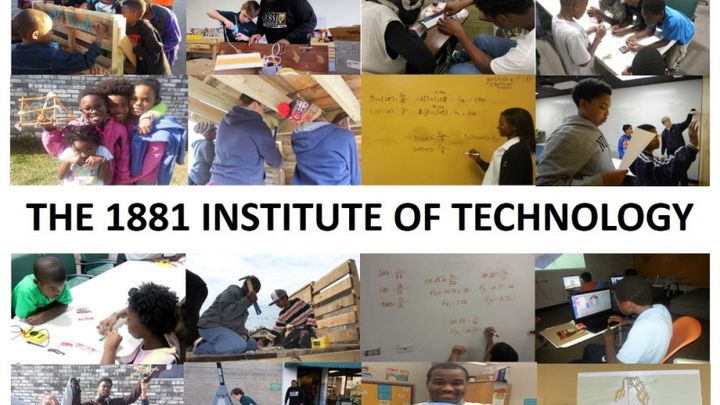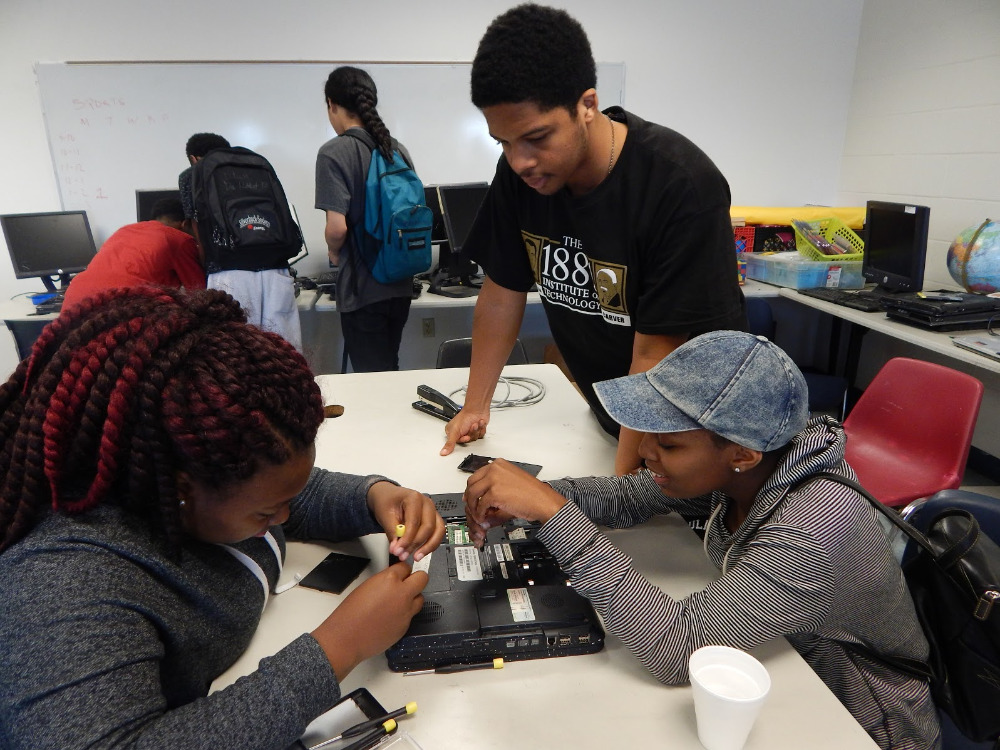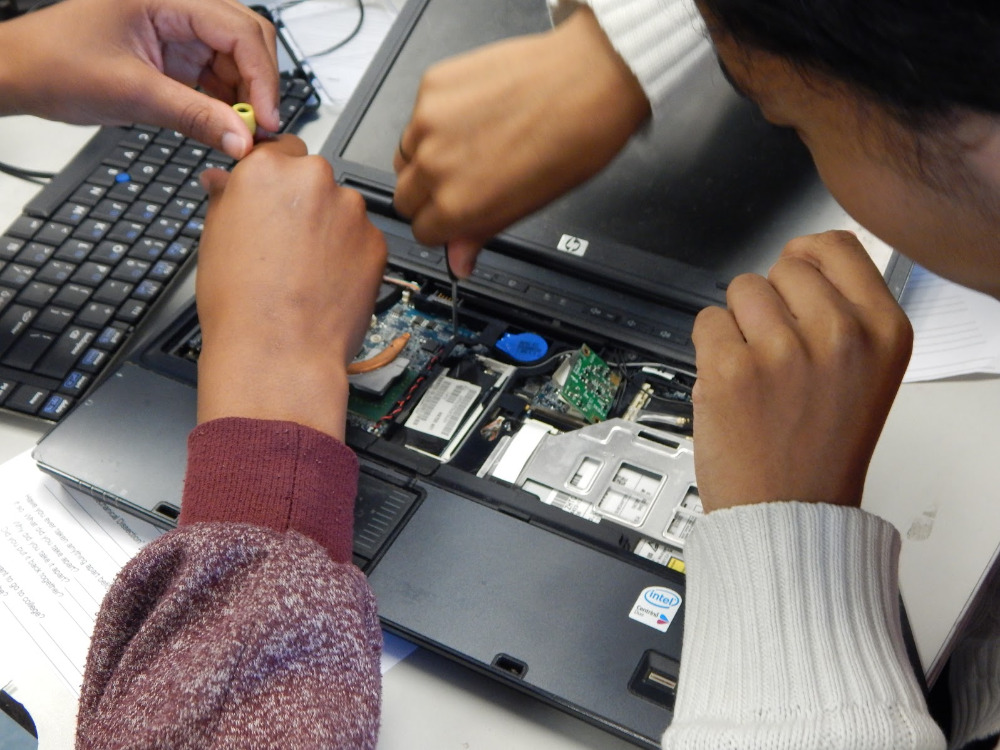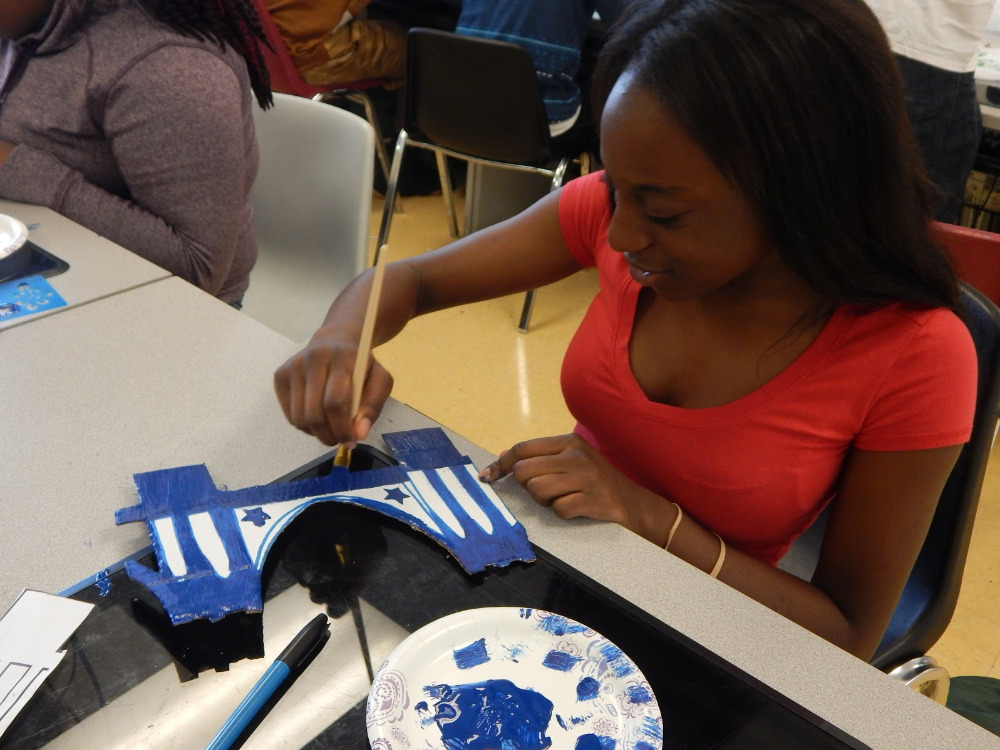
The 1881 Insitute Summer of Champs!
Donation protected
Our goal is to raise funds to help 10 students in the fall of this year!
Here's why, how, and what we will do . . .

Why . . .
A higher percentage of African Americans have an interest in STEM careers, but have the lowest percentage of students who obtain a STEM degree or enter into a STEM career. Researchers believe that this can be attributed to the failure of the K-12 system to educate minority youth, especially in STEM disciplines.
 Therefore, African American high school students need to be equipped to avoid obsolescence in the labor force, as it relates to STEM fields. The 1881 Research Institute (d.b.a The 1881 Institute of Technology) accomplishes this by implementing alternative school models for high school students, who are interested in STEM careers, but struggle in traditional classroom settings.
Therefore, African American high school students need to be equipped to avoid obsolescence in the labor force, as it relates to STEM fields. The 1881 Research Institute (d.b.a The 1881 Institute of Technology) accomplishes this by implementing alternative school models for high school students, who are interested in STEM careers, but struggle in traditional classroom settings.
How . . .
We believe the core of successful STEM education has three pillars:
(1) garnering interest in STEM education,
(2) preparedness for a STEM major/career, and
(3) successful entry into a STEM career; The 1881 Institute of Technology (1881) focuses on preparedness and successful entry.
Researchers, like Andrea B. Nikischer of Buffalo State University, suggest that barriers to STEM fields not only exist amongst racial lines, but along economic classes. Therefore, 1881 is designed to support the most underserved students in New Orleans. We are an open enrollment school, but we focus our recruiting and marketing efforts toward at-risk students who meet the following conditions so they have greater access to lucrative careers in Technology & Engineering fields:
-Foster child
-Homeless/runaway
-Pregnant or parenting
-Offender
-Disabled
-Behind one grade level or more
-Never held gainful employment
-English language learner
-School Dropout
-Basic Skills


What . . .
To accomplish this, students need to be motivated to pursue college as early as possible. However, motivation only is not enough. Students must be prepared for the expectations of technical majors in college. Research supports that students who complete a rigorous high school curriculum are much morelikely to complete a bachelor's degree. Additionally, a 2013vUS Dept of Education report, "STEM Attrition: College Students’ Paths Into and Out of STEM Fields", shows that students who take more advanced math classes are more likely to complete a STEM degree. Therefore, a critical way 1881 improves learning is by implementing 1881's core essentials to college preparatory learning. They include:
1) Emphasize the importance of math and help students achieve higher levels of math beyond Algebra 1
2) Mandate teachers to teach through hands-on activities with the use of experiments, props, and other materials so that students connect theory to actual practice
3) Change the role of the student in instruction from spectator to participant through hands-on activities
4) Offer students paid apprenticeships, within a CTE field, in the morning and core classes in the afternoon.
Thus, 1881’s curriculum exists within the following five domains:
1) Instructional practices, support, and assessments that prepare all students for academic success - first leading to graduation, then onto a college or university, and culminating into a STEM profession and career;
2) Maximize the time of hands-on activities and minimize traditional lectures.
3) Shadow and mentor 1881 graduates through high school, college and onto a STEM career;
4) Meaningful and active citizenship that prepares all students to practically apply their leadership and technical skills to improve their communities.
With your help the 1881 Institute can reach its goal of impacting these students!

Here's why, how, and what we will do . . .

Why . . .
A higher percentage of African Americans have an interest in STEM careers, but have the lowest percentage of students who obtain a STEM degree or enter into a STEM career. Researchers believe that this can be attributed to the failure of the K-12 system to educate minority youth, especially in STEM disciplines.
 Therefore, African American high school students need to be equipped to avoid obsolescence in the labor force, as it relates to STEM fields. The 1881 Research Institute (d.b.a The 1881 Institute of Technology) accomplishes this by implementing alternative school models for high school students, who are interested in STEM careers, but struggle in traditional classroom settings.
Therefore, African American high school students need to be equipped to avoid obsolescence in the labor force, as it relates to STEM fields. The 1881 Research Institute (d.b.a The 1881 Institute of Technology) accomplishes this by implementing alternative school models for high school students, who are interested in STEM careers, but struggle in traditional classroom settings. How . . .
We believe the core of successful STEM education has three pillars:
(1) garnering interest in STEM education,
(2) preparedness for a STEM major/career, and
(3) successful entry into a STEM career; The 1881 Institute of Technology (1881) focuses on preparedness and successful entry.
Researchers, like Andrea B. Nikischer of Buffalo State University, suggest that barriers to STEM fields not only exist amongst racial lines, but along economic classes. Therefore, 1881 is designed to support the most underserved students in New Orleans. We are an open enrollment school, but we focus our recruiting and marketing efforts toward at-risk students who meet the following conditions so they have greater access to lucrative careers in Technology & Engineering fields:
-Foster child
-Homeless/runaway
-Pregnant or parenting
-Offender
-Disabled
-Behind one grade level or more
-Never held gainful employment
-English language learner
-School Dropout
-Basic Skills


What . . .
To accomplish this, students need to be motivated to pursue college as early as possible. However, motivation only is not enough. Students must be prepared for the expectations of technical majors in college. Research supports that students who complete a rigorous high school curriculum are much morelikely to complete a bachelor's degree. Additionally, a 2013vUS Dept of Education report, "STEM Attrition: College Students’ Paths Into and Out of STEM Fields", shows that students who take more advanced math classes are more likely to complete a STEM degree. Therefore, a critical way 1881 improves learning is by implementing 1881's core essentials to college preparatory learning. They include:
1) Emphasize the importance of math and help students achieve higher levels of math beyond Algebra 1
2) Mandate teachers to teach through hands-on activities with the use of experiments, props, and other materials so that students connect theory to actual practice
3) Change the role of the student in instruction from spectator to participant through hands-on activities
4) Offer students paid apprenticeships, within a CTE field, in the morning and core classes in the afternoon.
Thus, 1881’s curriculum exists within the following five domains:
1) Instructional practices, support, and assessments that prepare all students for academic success - first leading to graduation, then onto a college or university, and culminating into a STEM profession and career;
2) Maximize the time of hands-on activities and minimize traditional lectures.
3) Shadow and mentor 1881 graduates through high school, college and onto a STEM career;
4) Meaningful and active citizenship that prepares all students to practically apply their leadership and technical skills to improve their communities.
With your help the 1881 Institute can reach its goal of impacting these students!

Organizer
Bahiy Watson
Organizer
New Orleans, LA